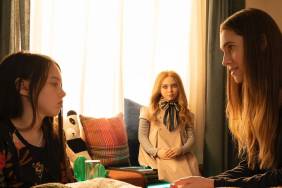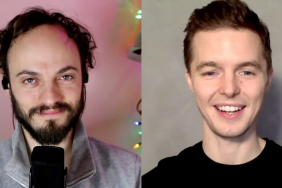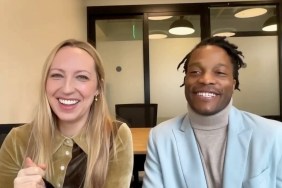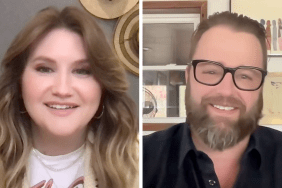The Honeymoon director Dean Craig sat down with ComingSoon to speak about his latest movie featuring Maria Bakalova. Craig discussed taking inspiration from his childhood friendships, commented on the cast performance, and more. The Honeymoon was released by Lionsgate on December 16.
The Honeymoon is written and directed by Craig (Death at a Funeral, Love Wedding Repeat). The film is led by Oscar nominee Bakalova, Asim Chaudhry, and Pico Alexander. The cast also includes Marco Valerio Montesano, Michele Enrico Montesano, and Bravo.
“Adam whisks his new bride Sarah to Venice for a honeymoon,” reads the synopsis. “But when Adam brings best friend Bav along for the ride, Bav causes one gross-out disaster after another. When charming gangster Giorgio falls for Sarah, he gets rid of Adam and Bav by sending them across the border on a drug-dealing mission. Can they outrun the Slovenian cops, dodge bullets from the baddies, and get back before Sarah gets a rich new mobster boyfriend?”
The Honeymoon hails from Notorious Pictures, with Guglielmo Marchetti serving as a producer. It is also produced by Bakalova and Piers Tempest.
Tudor Leonte: 2022 has been quite the year for you since you wrote and directed The Estate and then The Honeymoon. How was it to have such a busy schedule?
Dean Craig: Hard. It was an amazing year in many respects. I actually did The Honeymoon first and then The Estate. I was lucky enough to be in Venice and Rome making The Honeymoon, which was very, very fun, but obviously, filmmaking is always very intense and intensive and challenging. Then, I went pretty much straight to New Orleans to do The Estate, and deal with an entirely different film, an entirely different set of challenges. Yeah, difficult, difficult to be away from family and everything, but also a very blessed situation to be in, to get to make two films in a year. I dunno if that’ll ever happen again, but, yeah, it was an experience.
What was the biggest challenge in your opinion?
Wow. Being away from family is difficult for that, for that period of time. I have children and I miss them. And my wife of course. That kind of side of things is difficult. I think it’s like climbing. It’s a bit like climbing a mountain or doing a marathon. When you get to the end, you just want to collapse. You get over the line and it’s like… but in this case, it was like, you get over the line of that marathon and then someone says, ‘Okay, now go again.’ That’s a little bit what it felt like. From a kind of physical, mental, emotional standpoint, it’s challenging to do two films in a row. I don’t necessarily recommend it.
I saw The Estate too. I was curious to know whether there was anything from The Honeymoon that influenced The Estate.
That’s interesting. I think that they’re two very, very different films in my head. Do you know what I mean? I really thought of them both as very distinct from each other. I don’t know. You learn from every film that you do, obviously, and the hope is that you learn and improve and get better. I would hope that happens. Making a film is so specific, it’s so specific to the story that you’re trying to create, to the place where you’re making the film and to the people that you’re working with and the actors, especially that you’re working with. The film is really those actors in that setting. I’m sure I learned things from one to the other, but it was such a quick turnaround that it’s difficult to sort of almost see them… I’ll have to think about that one.
You have already been to Italy for Love Wedding Repeat. I would like to hear your fondest memory of Italy, and I’m asking since I’m Italian, so I am a bit biased here.
Clearly, or maybe it’s not good, but I love Italy. I have so many amazing memories of it. For Love Wedding Repeat, I was obviously living in Rome for the entire time, which was fantastic. What a place to be able to live even for a relatively short period. In terms of my memories… I think it’s the people I love. That’s what sort of took me back to a large extent to do The Honeymoon. I just loved the Italian people that I worked with. My producers, wonderful producers and wonderful people, a lot of the crew members, some of the crew members I got to work with the second time on The Honeymoon. I enjoy Italy. It’s a fantastic country. It’s a very beautiful country, and I’m just really fond of Italian people.
I heard some of your interviews, and you sound like an eclectic artist who likes getting his ideas from different sources. What were your main sources for The Honeymoon?
Well, The Honeymoon is really a film about friendship. When you’re writing a film about friendship, I suppose one of the things you do is you go to your own friendships and examine them. One of the things that I really wanted to make a film about was that moment in life when you have these friendships that are… I grew up with a lot of very close male friendships, and then one by one all of my friends get married or find a partner, so that relationship, that friendship changes naturally through that process. I really wanted to write something that was about that process but with a character who is refusing to allow that change to happen and who is hanging on for dear life onto that friendship. I thought that would be just a funny sort of relationship to explore. Well, I take inspiration from wherever I can get it, but in this case, it’s largely a film about friendship.
That would have been my follow-up question, and actually, I was afraid to ask, but did you take inspiration from your life for this story?
Of course, you always do in a certain respect. I can’t say that there’s one specific person that is Bav. I think that it’s the childhood friendships that are very specific. Even now, the age I am, the friendships I have with people that I was friends with when we were 13, 14, we’re still the same as we were when we were 13, 14. Do you know what I mean? I’m sure you have the same. There’s something about those friendships that I think it’s incredibly special, but it’s also where those sort of boundaries get blurred, and people cross over boundaries because they’re different when you are younger, so when you carry those sort of blurred boundaries into adult life, it can be quite strange and different to the friendships you make when you’re an adult. It’s really about that. I did look at my childhood friendships and take inspiration there for sure.
I really appreciated the friendship between Bav and Adam. Even though they have been apart for a while, they seem to share a special relationship. How would you describe that?
There’s a lot going on in their relationship. The idea of them is that they have been friends for a very, very long time since they were children. Then, there’s this sort of problem in their relationship, which was brought about by the fact that one of them moved to America and the other one stayed behind and felt left behind. They still have that kind of closeness and that sort of brotherhood almost. At the same time, there’s a lot of complicated feelings in there. There’s feelings of guilt that Adam has and feelings of responsibility that he has towards his friend who he feels he’s left, and Bav having a feeling of sort of having lost this guy his best friend at a certain point in his life doesn’t wanna lose him again. It’s a very specific kind of relationship that they have that is part of what leads to this whole kind of fiasco that they find themselves in the film.
Briefly, this story features a wedding, annoying best men, Italian mobsters, and drug dealing. What could grow wrong?
Exactly. Some things you want in a film!
You worked with several comedians in your career. What is it that you look for in a comedian usually?
Being funny? It depends. I work with people, or I try to work with people that I respect and whose work I admire and that I feel would be a good fit for me. I mean, Asim [Chaudhry] is a very good example of somebody who I’ve watched his work since he came around and doing People Just Do Nothing. He’s incredibly talented and funny. It was a real thrill to get to work with him. I mean, he’s really one of the best that we have in the UK at the moment. Similar with Maria [Bakalova]. I mean, I watched her in Borat, she was phenomenal and would just sort of like grab the opportunity to potentially work with her and was delighted when she came on board. She’s a very lovely, wonderful person as well to add to it.
I think that it’s that mixture of things, really. You look for talent, you look for that special talent, that’s what you want. I think Pico [Alexander] had that as well. He was an extremely talented young actor. I think he’s gonna go a very long way and we were very lucky to have him in the film. Then, Lucas Bravo, of course, who is also like a different but very special kind of talent. The four of them are so completely different from each other, but bring something or bring something very special to the film. We were very lucky with that cast. Filmmaking, as we’ve said, is a difficult process. When you’ve got people who are really lovely to work with and a pleasure to work with, that’s not to be taken for granted.
Is there any particular scene from the movie you enjoyed shooting or writing or shooting-and-writing since you did both?
There were so many scenes that were fun that I kind of just like I remember like looking forward to doing the scenes. The scene in the bedroom when Bav is planning to surprise the couple. That was not an easy scene to shoot. A fun one? The scene where Bav is shouting on the canal, do you remember that when they kind of come by gondola?
And everyone is looking at him.
I was really looking forward to shooting that and sort of dreading it at the same time ’cause I knew there’s no way of doing this except that Asim / Bav has to scream his head off in the middle of Venice. We did have people shouting back. I remember there was someone, like random, in Venice somewhere shouting ‘Adam’ anyway, like shouting back to Bav. Yeah, that was a very fun and funny one to do. Yeah. There were a lot, though, it was nonstop on that film.
You mentioned the Asim, the post-credit scene is money in my opinion. How did he come up with that? Or was it your idea?
As in the real-life moment?
Yeah.
Hope people hang on and watch that because it is lovely. Yeah, we discussed it. His then-girlfriend was coming out to stay, and he knew he was going to propose. I can’t remember how the idea came about, but I thought it was a good idea to get this on film, to do it in the middle. I think he had the idea of like having an actual fake scene that he would be shooting, and then he’d come over to her. We just made sure that we were there to capture this amazing moment. It really was special. It was a special thing to witness and to be there for and to get on film. It’s a lovely moment. I really wanted to end the film with it ’cause I just thought, ‘You’ve gone through a lot with Bav, you know?’ It’s lovely to see Asim in a real-life moment that’s very special and very sweet. I really hope people hang on and watch that at the end of the credits.
Yes, it is sweet indeed. We discussed comedians before. As a director, is there any space for actors to improvisation since comedy sometimes features improv? How is your relationship with that?
Generally, I love improvisation. It’s something that I want on set. From my perspective, we get the scene as written, we make sure we get everything, we make sure we get all the beats, and then if there’s any time at all, I wanna improvise and at least try some improvising. It’s different for different actors. Some people love, really enjoy improvising and want to improvise, and some people don’t. If there’s ever a really good improviser, like Asim is an amazing improviser, and, of course, Maria did a lot of improvising when she did Borat. If you got these actors who are up for it and good at it, then it’s crazy not to have that talent and that ability, and not try and see what gold you can get. I am very open to improvising. I’m very open to ideas as well. I remember Asim had lots of ideas that he brought onto set or into the writing process. He’d say, ‘Oh, maybe my character could do this or that.’ And I’m like, ‘Great. Yeah, let’s do that. Let’s try it.’ I’m very open to improv, very open to trying things because you never know what you can get.
And what about you? Any upcoming projects? Are you going to take a little break right now? A well-deserved break, I would like to add. What’s next for you?
You are the only person saying that. Well, another people saying I deserve a break. I’m writing another script to be set in Italy actually. I have that. I’m also doing another film that I’m writing for the producers at The Estate. A little break from directing, at least until I’ve got my next script written and ready to go. I’ll be back on there, you know, probably quite soon if I can. We’ll see what happens. You never know with this business, do you?
Sounds good. It’s great to hear that you still have plenty of projects. I’ve actually finished my questions. Do you have any last messages you would like to share with us today?
I just hope that people see The Honeymoon and enjoy it. I think that especially at the time we made it, which was in 2021, where everyone’s going through a tough time, and we’re still going through a tough time, we all wanted to make something that was just fun. Just a fun time to give audiences a little bit of a break from the heaviest stuff that goes on in the world. That’s the idea and I hope that audiences get that sort of fun time from it.










